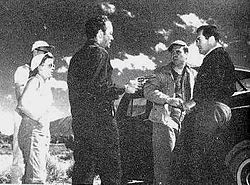The Filmakers Inc.
| ISIN | 🆔 |
|---|---|
| Industry | Film |
| Founded 📆 | 1948 |
| Founders 👔 | |
| Defunct | 1955 |
Area served 🗺️ | |
| Products 📟 | Film production |
| Members | |
Number of employees | |
| 🌐 Website | [Lua error in Module:WikidataIB at line 665: attempt to index field 'wikibase' (a nil value). ] |
| 📇 Address | |
| 📞 telephone | |

The Filmakers Inc. [sic] was an independent film production company created "to produce, direct, and write low-budget, social issue-oriented films".[1][2][3] It was formed in 1948 by actress, director, and producer Ida Lupino as vice-president, her then-husband producer and writer Collier Young as president, and screenwriter Malvin Wald as treasurer,[4] The company produced 12 feature films, six of which Lupino directed or co-directed, five of which she wrote or co-wrote, three of which she acted in, and one of which she co-produced.[5]
The Filmakers' mission was to make socially conscious films, encourage new talent, and bring realism to the screen.[6] Their goal was to tell “how America lives” through independent B pictures shot in two weeks for less than $200,000 with a creative “family,” “the ring of truth” emphasized by fact-based stories — a combination of “social significance” and entertainment.[7] In short, low-budget pictures, they explored virtually taboo subjects[7] such as rape in Lupino's Outrage (1950) and the self-explanatory The Bigamist (1953).[5] The latter received rave reviews at the time of release, with Howard Thompson of The New York Times calling it "Filmakers' best offering, to date".[8] Lupino's best known directorial effort, The Hitch-Hiker, a 1953 RKO release, is the only film noir from the genre's classic period directed by a woman.[9][10]
The Filmakers were careful low-budget film makers, reusing sets from other studio productions, and using what is now called product placement for remuneration, for example placing Coca-Cola, United Airlines, Cadillac, and other brands in their films, such as The Bigamist. Lupino was acutely conscious of budget considerations, planning scenes in pre-production to avoid technical mistakes and retakes, and shooting in public places such as MacArthur Park and Chinatown to avoid set-rental costs.[4]
The Filmakers' 1949 film Never Fear was noticed by Howard Hughes, who was looking for suppliers of low-budget feature films for distribution by his recently acquired RKO Pictures. Hughes agreed to put up financing and distribute Their next three features through RKO, leaving The Filmakers total control over the content and the production of the films.[11]
The company ceased operations in 1955.
Select Filmography[edit]
| Year | Title | The Filmakers Inc. function |
Screenplay / Writers |
Producers | Directors |
|---|---|---|---|---|---|
| 1949 | Not Wanted | Production Company (Emerald Productions) |
Paul Jarrico Ida Lupino Malvin Wald |
Anson Bond Ida Lupino |
Elmer Clifton Ida Lupino (uncredited) |
| 1949 | Never Fear | Production Company | Ida Lupino Collier Young |
Norman A. Cook Ida Lupino Collier Young |
Ida Lupino James Anderson (assistant) |
| 1950 | Outrage | Production Company | Ida Lupino Malvin Wald Collier Young |
Collier Young Malvin Wald |
Ida Lupino |
| 1951 | Hard, Fast and Beautiful | Production Company | Martha Wilkerson | Norman A. Cook Collier Young |
Ida Lupino James Anderson (assistant) |
| 1951 | On the Loose | Production Company | Dale Eunson Katherine Albert |
Collier Young | Charles Lederer James Anderson (assistant) |
| 1952 | Beware, My Lovely | Presented by | Mel Dinelli | Collier Young Mel Dinelli |
Harry Horner |
| 1953 | The Hitch-Hiker | Present | Ida Lupino Collier Young |
Collier Young Christian Nyby |
Ida Lupino |
| 1953 | The Bigamist | Production Company © |
Collier Young | Robert Eggenweiler Collier Young |
Ida Lupino |
| 1954 | Private Hell 36 | Presents © |
Collier Young Ida Lupino |
Robert Eggenweiler Collier Young |
Don Siegel |
| 1955 | Mad at the World | Production Company | Harry Essex | James H. Anderson Collier Young |
Harry Essex |
References[edit]
- ↑ Acker, Alley (1991). Reel Women – Pioneers of the Cinema, pp. 74-78. The Continuum Publishing Company, New York. ISBN 0-8264-0499-5 Search this book on
 .
.
- ↑ Collins, K. Austin. "Ida Lupino, the Mother of American Independent Film, Finally Gets Her Due". Vanity Fair. Condé Nast. Retrieved 2 December 2020.
- ↑ Hicks, Ted. "Ida Lupino – Filmmaker". Films etc.
- ↑ 4.0 4.1 Donati, William (1996). Ida Lupino A Biography, The University Press of Kentucky. ISBN 0-8131-1895-6 Search this book on
 .
.
- ↑ 5.0 5.1 Hurd, Mary (2007). Women Directors & Their Films, pp. 9–13. Praeger, Westport, Connecticut. ISBN 0-275-98578-4 Search this book on
 .
.
- ↑ "Never Fear (The Young Lovers) 1950". MoMA Highlights: 375 Works from The Museum of Modern Art, New York. The Museum of Modern Art, New York.
- ↑ 7.0 7.1 Huber, Christoph. "Mother of All of Us: Ida Lupino, The Filmaker". Cinema Scope.
- ↑ H.H.T. (Henry Howard Thompson Jr.) (1953-12-26). "At the Astor". The New York Times. Retrieved 2019-08-17.
- ↑ Muller, Eddie (1998). Dark City: The Lost World of Film Noir. New York: St. Martin's. p. 176. ISBN 0-312-18076-4. Search this book on

- ↑ Cousins, Mark (2004). The Story of Film. New York: Thunder's Mouth. ISBN 1-56025-612-5. Search this book on

- ↑ Dixon, Wheeler Winston. "Ida Lupino". Senses of Cinema. Senses of Cinema. Retrieved 2 December 2020.
This article "The Filmakers Inc." is from Wikipedia. The list of its authors can be seen in its historical and/or the page Edithistory:The Filmakers Inc.. Articles copied from Draft Namespace on Wikipedia could be seen on the Draft Namespace of Wikipedia and not main one.
